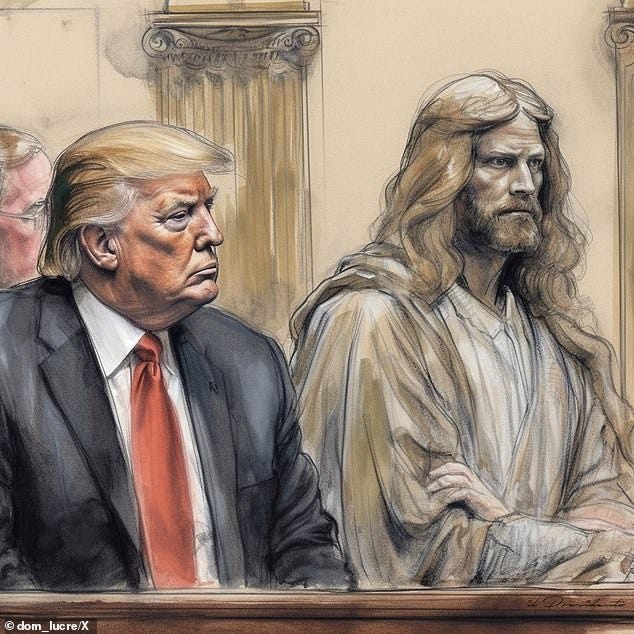The perversion of faith and country
Christian nationalists threaten both America and the church
An image now circulating on social media looks like a genuine courtroom artist’s sketch. It shows a pouting Donald Trump in his unbuttoned suitcoat, red tie dangling, shoulders hunched, golden hair jutting out like the bill of a ball cap. In other words, it’s a very accurate portrait. To Trump’s left, broad-shouldered and attentive, sits Jesus as most conservative Christians picture him, dressed in white robes, with flowing blond hair, and a full beard. His face is set in a grim expression.
First posted on X (formerly Twitter) by a Trump follower, the picture was picked up and reposted by Trump’s social media account as he faced the judge overseeing his trial for fraud in New York. When the New York Post shared the story with its readers, the editors called the whole thing “bizarre,” treating it like the expression of some fringe idea. In fact, millions of conservative Christians believe, as an article of faith, that Trump is a martyr who could, through his suffering, make the United States into a Christian nation.
As a believer who was raised among fundamentalists, I knew the Church was becoming politicized. But it wasn’t until Trump that it fully embraced Christian nationalism, becoming a political religion gathered around the most profane, destructive, and immoral person ever to rise to the top of national politics. As he divides the nation, he is pulling conservative Christians further and further from the faith as I know it, and into a cult of personality, which his followers have decorated with the cross.
More and more conservative Christians are adopting the view that the elected U.S. government is evil and should be replaced by faith-filled rulers who follow laws based on their own version of Christianity. This would make America a theocracy akin to Talban-ruled Afghanistan, the only country in the world where religion and the law are one and the same.
My own faith is based on a sense of Christ as an open-hearted, generous, and forgiving healer -- the Prince of Peace, as Catholics often call him -- who never intended to start a new religion to destroy civil authority. Asked if Jews should pay taxes levied by the Romans he said, “Render unto Caesar the things that are Caesar's, and unto God the things that are God's." He did not say that those who followed him should ignore government authorities or, as some American fundamentalists suggest, refuse to pay taxes.
Jesus also said that “it is easier for a camel to go through the eye of a needle than for a rich man to enter the Kingdom of God.” This message flies in the face of the popular modern Gospel of Prosperity, which comes and goes in conservative Christian circles. It suggests that wealth is a sign of God’s favor and, conversely, poverty is a sign of his disfavor.
Although I do not believe that the rich are barred from heaven, I do think that Christianity confers on people of means a particular charitable burden. This is what I think Jesus meant when he said, “Whatever you did for one of the least of these brothers and sisters of mine, you did for me.” The “least” were obviously the poor and the powerless and he was saying that when you love and care for them, you love and care for him.
In my experience, you can follow Christ’s admonition about the “least” in ways that remain true to conservative politics. My conservative Republican father is a living example. He spent nearly all of his working life in the non-profit sector, helping people who needed more than they could provide for themselves. In his most successful program, he oversaw the opening and operation of stores that served the underprivileged, allowing people to pay what they could, even if it was pennies. The program, which also provided jobs, supported the dignity of those who participated without turning anyone away.
Ultimately, you might say that my version of Christianity focuses on the example of Jesus as the steadfastly moral and loving Son of God, who walked the Earth with open arms. He calls me to respect all and work for peace and not a theocracy. Those who see, instead, a figure who would embrace Christian nationalism will, if they prevail, pervert both a faith and a country.





Excellent article, Adam. I’m a Catholic priest and I couldn’t have written it any better. Perfectly stated. Let us all keep Jesus’ gospel message of peace and love, at least in our hearts, and then, in imitation of him, share it with all others. Yes, lets keep religion out of government and bring in morality, integrity and decency.
Exactly right as usual. I wonder what faith leaders who follow Trump and ask their followers to do the same think about what they are doing—I always believed that faith leaders were a contemplative lot. Perhaps that is a thing of the past. I cannot understand how anyone who reads the New Testament and professes to spread the word of God can honestly say that Trump is essentially Jesus incarnate. It sickens me.